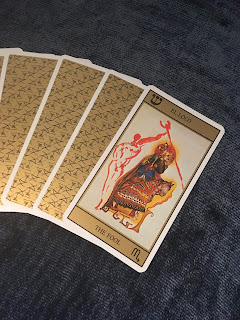About
This blog discusses how to use various divination methods as writing prompt generators. We'll be working with tarot decks, tea leaves, pendulums, dreams, random passages of books, and the raw creative power of the subconscious.
My posts outline how to use these various divination tools and apply them to common writing roadblocks, including character creation, protagonist choices, plot points, narrative structure, and inspiration.
Click the sidebar to directly navigate to posts about specific writing issues or divination methods.
Method
I practice tarot as a psychological instrument—a way to draw out meanings from the subconscious. Due to the subjective nature of oracles, writers who use tarot, bibliomancy, or other divination methods can draw from a deep well of symbolic meanings and individual associations with near-unlimited outcomes. This makes divination an ideal tool for writers, as it pulls from ideas lying dormant in the mind and imbues them with new significance.
Your brain stores an alarming amount of data, from what you learn in school, to snippets of conversations you've overheard, vague snapshots of dreams, and a multitude of narratives, concepts, and archetypes absorbed through books, media, and pop culture. This means even in the throws of writer's block, you have enough ideas archived in your subconscious to write ten thousand stories, let alone just one. All you have to do is unlock this knowledge from the hidden corners of your brain.
By following the methods I explore in this blog, you'll learn how to overcome writer's block using your mind's natural desire to create meanings. It works almost like magic...
Magic holds great significance in Wicca, Satanism, and Modern Paganism, and also appears in some Jewish and Christian traditions as well. Some people may believe in deities, spirits, or the paranormal, but don't incorporate them into their craft. Divination can also be part of a cultural ritual, and magic plays an important part in many other ethnic and spiritual traditions.
Your brain stores an alarming amount of data, from what you learn in school, to snippets of conversations you've overheard, vague snapshots of dreams, and a multitude of narratives, concepts, and archetypes absorbed through books, media, and pop culture. This means even in the throws of writer's block, you have enough ideas archived in your subconscious to write ten thousand stories, let alone just one. All you have to do is unlock this knowledge from the hidden corners of your brain.
By following the methods I explore in this blog, you'll learn how to overcome writer's block using your mind's natural desire to create meanings. It works almost like magic...
Personal Beliefs
I identify as an atheist and a witch, meaning my craft is secular, and I don't believe in the divine or the supernatural. I view magic as a psychological ritual for self-knowledge and empowerment. I use tarot as a writing aid as well as for personal use to understand my emotions and latent thoughts.
Magic means different things to different people—its definition and application are entirely subjective. Though I'm not a spiritual person, I'm interested in the occult, neo-paganism, and magical subcultures from an academic perspective, and am currently researching these topics for a short story.
Many people who identify as witches do believe in the paranormal aspect of divination, and this blog does not seek to discredit such beliefs or experiences. Witchcraft is a versatile practice that varies by culture, religion, and individual belief system. This means you can practice witchcraft with or without a religion. Some consider it spiritual, while others consider it psychological. In short, witchcraft is something you do to carry out your intent, not a belief system in itself.Magic means different things to different people—its definition and application are entirely subjective. Though I'm not a spiritual person, I'm interested in the occult, neo-paganism, and magical subcultures from an academic perspective, and am currently researching these topics for a short story.
Disclaimer
Magic holds great significance in Wicca, Satanism, and Modern Paganism, and also appears in some Jewish and Christian traditions as well. Some people may believe in deities, spirits, or the paranormal, but don't incorporate them into their craft. Divination can also be part of a cultural ritual, and magic plays an important part in many other ethnic and spiritual traditions.
Brief Author Bio
 |
| Aradia, your witchy writer guide |
I am currently earning my B.A. in English from a university in California's Central Valley. After graduation, I plan to work as a freelance writer and editor, and am interested in careers involving library communities, social justice, and literacy nonprofits. My dream job is to edit for a publishing house that centers diverse voices. Right now I'm working on finishing my novel, a queer feminist re-imagining of the Ancient Greek Persephone myth.
You can read my digital grimoire here.
As someone of Italian ancestry, I'm interested in learning more about stregheria, traditional Italian folk magic. And as a feminist socialist, I just love the image of witchy peasant women plotting to overthrow their oppressors.
Pen Name
My pseudonym comes from Charles Godfrey Leland's book, Aradia: Gospel of the Witches, an alleged account of a witch-cult in Tuscany, Italy. According to Leland, the coven worshiped the goddess Aradia, who taught them magic so they could lead the peasants in rebellion against their oppressors and overthrow the Roman Catholic Church.As someone of Italian ancestry, I'm interested in learning more about stregheria, traditional Italian folk magic. And as a feminist socialist, I just love the image of witchy peasant women plotting to overthrow their oppressors.
Series
My Craft: Posts about my personal practice
Divination 101: Crash-courses on the history and application of various divination methods
Pop Culture Magic: A series following tarot's appearances in books, tv shows, and film
Thrifty Divination: How to use (and sometimes make) affordable alternatives to traditional divination
Thrifty Divination: How to use (and sometimes make) affordable alternatives to traditional divination


Comments
Post a Comment